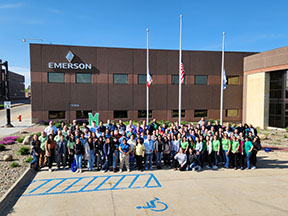MCC moves toward federal HSI designation

CONTRIBUTED PHOTO – Justin Sanchez Rubio, who immigrated from Cuba, said he didn’t have the educational opportunities like he does at MCC. Since coming to Marshalltown, Sanchez Rubio has completed ESL courses as well as courses for his future profession.
As Latino and Hispanic enrollment increases at Marshalltown Community College (MCC) every year, the school moves closer to being designated a Hispanic-Serving Institution (HSI), a federal recognition for colleges and universities which have a full-time undergraduate enrollment of at least 25 percent Hispanic students.
If MCC reaches that percentage, it will be the first HSI in Iowa and join the ranks of over 400 in the United States.
“I think getting this designation would help community members recognize that we’re here to serve them, and that we have a lot of resources and services here for them,” said Theresa Orlovsky, ESL professor at MCC.
HSIs can compete for grants to improve academic attainment, promote post baccalaureate enrollment, and to increase the number of Hispanic and low-income students studying science, math, engineering or technology. The U.S Department of Education provides over $100 million in funds annually to HSIs.
“It’s exciting to have the potential down the road of being able to apply for some things that maybe we haven’t been able to apply for in the past,” MCC Provost Robin Lilienthal said. “And when you would apply for a federal grant, you might have an opportunity to have a leg up when you are a Hispanic Serving Institution, even if that grant was not necessarily specifically identified as only for HSIs.”
As of the spring semester of 2022, 19.4 percent of MCC students identified as Hispanic or Latino. However, the US department of education does not calculate the percentage of Hispanic or Latino students with the same methodology.
To determine HSI status, they use the full-time equivalent undergraduate enrollment data, meaning many part-time Hispanic students at MCC would not factor into the percentage tracked by the government.
Regardless of which method is used, MCC students self-report their race and ethnicity to the college, which Lilienthal said may cause some under-reporting of the number of Hispanic or Latino students.
“Particularly if a student is undocumented, they sometimes will not identify their race or ethnicity because of fear that that information could have a negative impact on themselves or their family, which we would not do,” Lilienthal said.
In 2018, the research organization Excelencia in Education designated MCC as an Emerging HSI — denoting a Hispanic and Latino enrollment between 15 and 24.9 percent of the total student body. Excelencia in Education has labeled over 360 institutions as Emerging HSIs, and many have gone on to receive the full designation.
According to research by the American Council on Education, students at two-year HSIs have double the economic mobility rates as students at two-year non-HSIs, which holds for all students at HSIs whether they are Hispanic or not.
Even though the prospect of full-HSI status excites many administrators and faculty at MCC, Lilienthal said the college is not pursuing an explicit strategy to just raise Hispanic and Latino enrollment numbers.
“We are specifically working towards serving our Hispanic and Latino students because it’s the right thing to do for our community,” Lilienthal said. “But it’s not with the intent to receive some sort of designation such as an HSI.”
In 2019, MCC embarked on an initiative to expand opportunities for Hispanic students and increase successful education outcomes.
“The slogan we came up with was MCC Es Para Mi, which in Spanish means ‘MCC is for me,'” Orlovsky said. “That’s kind of one of our main mindsets going into this. We want our Hispanic students to feel supported and welcome here and to know that a college education is for them.”
The College chartered a collegiate chapter of the League of United Latin American Citizens (LULAC). MCC LULAC has hosted events for Hispanic students including art exhibitions, panels and networking events with local Al Exito clubs.
MCC also began hosting Latino Family Nights for families to meet with MCC staff and learn about higher education enrollment, financial aid opportunities or other resources for Latino students.
Before the pandemic, the Family Nights were held at least once a semester, often more frequently, but these events have moved onto Zoom and have declined in frequency after COVID-19 emerged. Now, in 2022, Lilienthal is optimistic that MCC will bring in-person Latino Family Nights back as case counts drop nationwide.
Lilienthal also said MCC will be posting job openings for Spanish-speaking advisors and recruiters. Diversifying the faculty and staff of MCC, she said, is one of MCC’s main goals right now.
“The more Spanish speakers that we have on campus, the better,”
Orlovsky said.

CONTRIBUTED PHOTO –
Marisol Lopez Silva, a first-generation college student, said her studies at MCC are an essential part of her life right now. “It provides me with the opportunity to accomplish my educational goals and prepare me for my future.”

CONTRIBUTED PHOTO –
Lusia Alvarez is a second-generation immigrant and student at MCC. “Seeing the importance of education is a huge step in the Latino culture and parents now encourage us to go to college,” she said. “They want a better education, future and life for me.”






